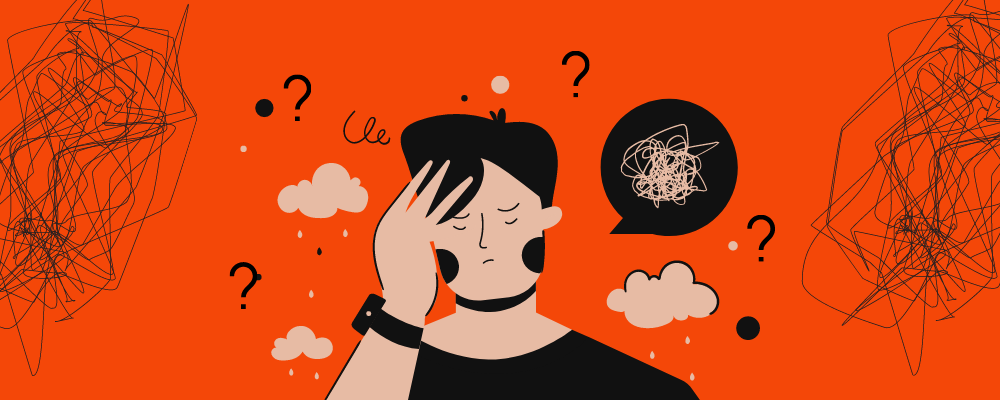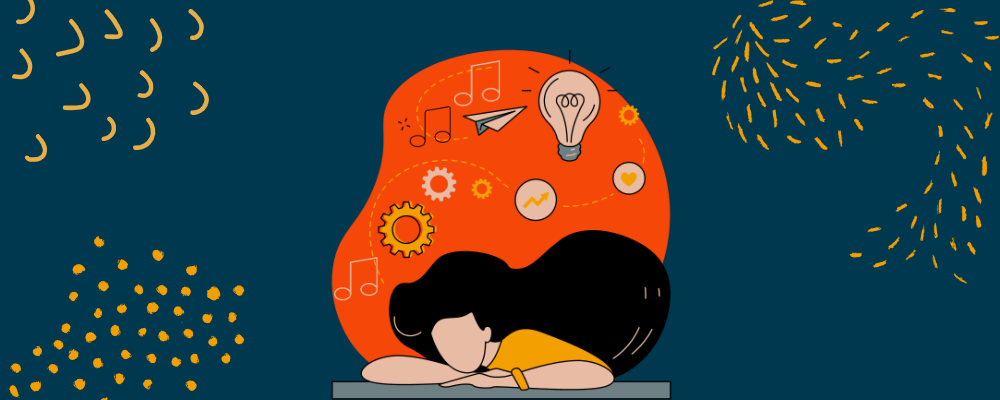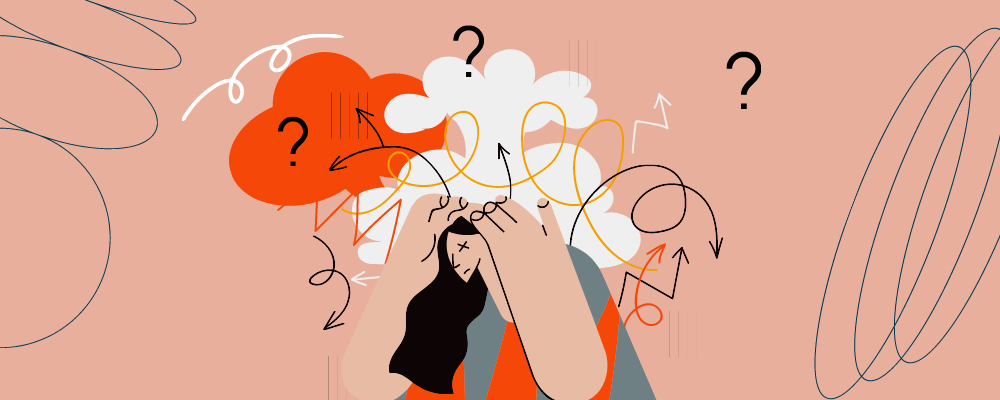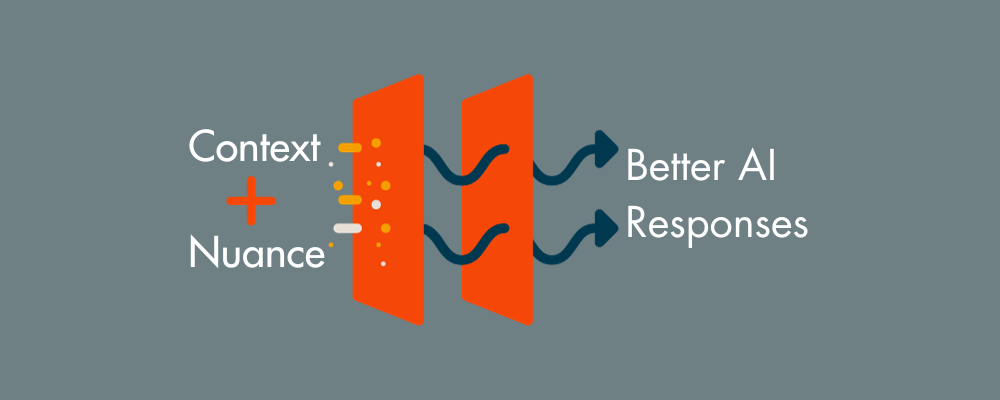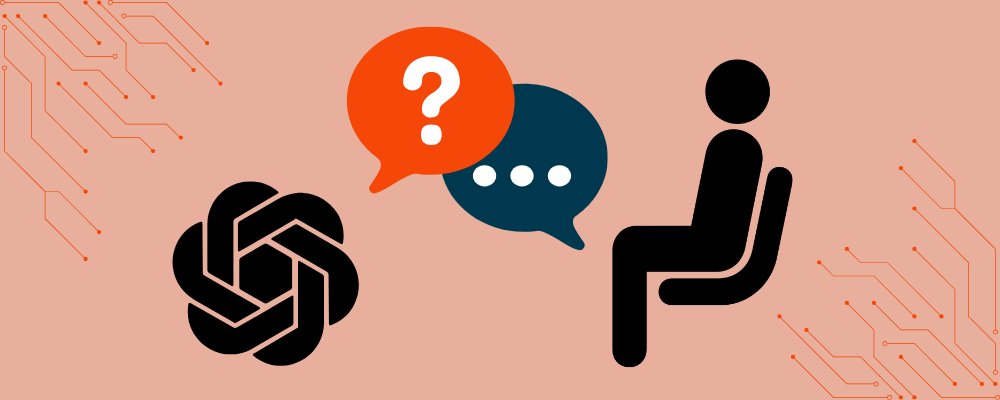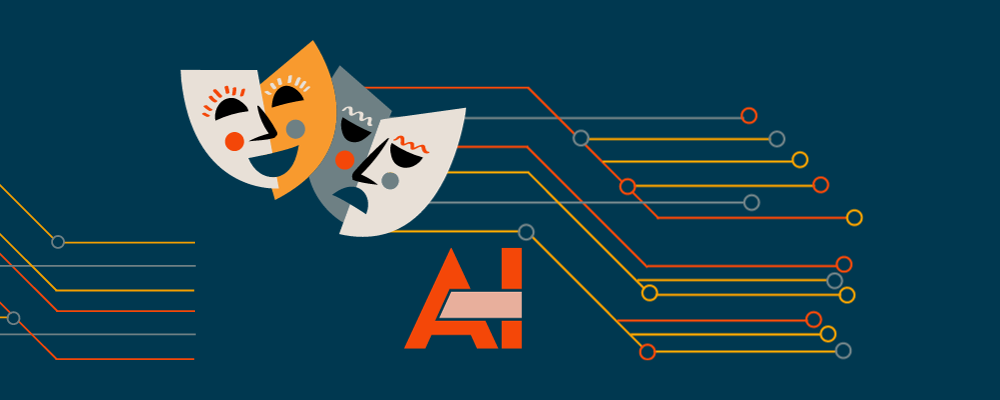What Am I Feeling? How to Cultivate Emotional Self-Awareness
About five years ago, I left my corporate gig as a film marketing executive and jumped into the unknown with both feet – and excruciating anxiety.
Without a full-time job, my days were less scheduled, and more unpredictable. I would start my mornings by working out, and then tackle chores, doctor appointments, and other things I had been neglecting for years because of my long work days.
Some days, while I was driving to my appointments, I would sense a subtle feeling of unease. A restlessness.
My heart rate would speed up, and I would feel weak or dizzy.
Did I eat something bad? I would ask myself. Could it be the flu?
The feelings would escalate into a sense of overwhelm, an unfamiliar turmoil inside of me. Some days I would start crying uncontrollably. I needed to pull the car over, step out, and breath.
It would take me up to a half an hour or so to feel stabilized before I could start driving again.
It wasn’t the flu.
What was going on? Why was I crying on my way to get an oil change? Why did this keep happening every few weeks? How can I not know what is really going on with me?
It took me a few years to uncover the answers to these questions.
Our emotions are multifaceted and extremely complex. Often, we experience multiple emotions at once, each expressing itself differently in each of us.

This makes it really hard to figure out what we’re feeling, and how our emotions are impacting our behavior, actions, decisions, and our entire lives.
Most of us haven’t learned the vital skill of emotional self-awareness, nor realize that we need to. I definitely had not. I didn’t even know emotional self-awareness was a ‘thing.’
I asked my good friend, David Sauvage, for help. David is an empath, who can feel the emotions of others. He teaches emotional intelligence and empathy, and helps people understand themselves and others in a much deeper way.
I got to learn tons from him about the central role of our emotions in our overall psychology. He also helped me tap into my inner world – emotions, thoughts, beliefs, memories, and else that goes on within us.
In the beginning all I could sense was a whisper of what I could guess was a roar within me. But, I was hooked. I started reading all I could find on the topics of emotions. And, I got to practicing.
It has taken me several years to develop a deep understanding of my own emotions, and to recognize them as powerful allies in connecting to my truth, and authentic self.
I’m going to share some of the most valuable things I’ve learned with you. Click below to jump to any section:
What is Emotional Self-awareness?
Although most of us assume we know what we’re feeling at any given moment, the truth is that we rarely do.
My friend, David Sauvage, has an analogy for this that I like a lot. He says: “It’s a little bit like we’re all playing poker with each other, but nobody can even read their own cards.”
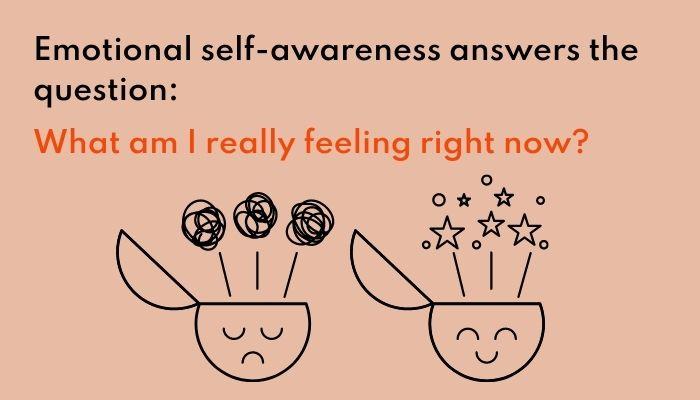
Emotional self-awareness is the awareness of our internal experiences – our emotions.
It is the capacity to sense inner signals, and tune into our own emotions so we can have a genuine understanding of what is actually going on within us on the deepest level.
Why is Emotional Self-awareness Important?
The simple answer is because our emotions are running the show.
Although we think of ourselves as logical beings, most of our behavior, actions and decisions are driven by our emotions. According to neuroscientist, Antonio Damasio, we make decisions based on our feelings at least 95% of the time.
This means our emotions also rule our relationships, businesses, and careers. And all else in our lives.
Emotions are the keys that unlock a deep understanding of ourselves, our patterns, and how we show up in the world.
What motivates us? Why do we do what we do? Or react in exactly the same way when we’re faced with similar conflicts or situations? Why are certain bad habits so challenging to break? Why do we find ourselves in relationships with similar dynamics over and over again?
We can only find these answers by becoming aware of, and deeply engaging with, our true emotions. This essential skill is key to every aspect of our lives.
- Emotional self-awareness is foundational to our connection to, and relationship with ourselves. It helps us understand our needs and wants, and to set healthy boundaries, which makes it more likely for us to actually get what we want and need.
A healthy relationship with ourselves serves as the foundation for all of our other relationships. This skill also heightens our ability to sense others’ emotions, and understand their experiences. It is essential to empathy, authentic communication, connection, relationships and true intimacy. - Emotional self-awareness helps us to identify, navigate, and work through our emotional triggers, so we can better understand them, and over time, lessen their intensity.
Becoming more conscious of our internal state is the first step in managing our emotions during conflict and high stakes situations, so we can be less reactive and respond in a more grounded and intentional way.
It can save us jobs, marriages, and even sports championships, aside from raising our negotiation game when the other side is playing hardball. Identifying these triggers is also the initial step in understanding their root cause and beginning our healing journey. - Emotional self-awareness puts us in touch with our intuition. Our inner knowing. Without a deep connection to ourselves, we are unable to connect with our internal compass.
The Path to Emotional Self-awareness
This path to greater awareness of our inner world requires us to have a healthy relationship with our emotions. And for most of us, this will path will be a life-long journey which requires lots of patience and self-compassion.
And it all begins with the understanding of the following four truths:
1. Everything we feel, every feeling, is valid, and worthy of our attention and care. As humans, experiencing the full range of emotions is not only normal, but also healthy.
There are no exceptions here, and no emotions are off limits. There are no “bad” or “good” emotions. Some are just so dang challenging to experience.
That means, it is also completely normal to have the blues, from time to time. Even, to be really blue.
But the most important thing to remember is that as healthy humans, we are supposed be feeling the entire spectrum of these emotions. Feeling them is normal. Real normal. Even when is sucks.
In order to get in touch with our emotions, we need to orient towards, accept & embrace them. It is important for us to engage with whatever that is actually arising in us, rather than what we want, or hope to be feeling.
Accepting our emotions as they arise, observing them without judgement, and exploring them with curiosity is essential to a deeper understanding of our inner experience.
As we become more familiar and comfortable with this process, it gets easier to embrace our true emotions, and to make friends with even the “ugliest” ones.
My favorite expression of this truth about emotions comes in the form of a poem called “The Guest House”, by the 13th Century Sufi poet, Rumi. He invites us to embrace, welcome and be grateful for each and every one of our emotions, because they have all been sent “as a guide from beyond.”
I’ve included the poem below, in case you are curious to read it.
The Guest House
This being human is a guest house.
Every morning a new arrival.
A joy, a depression, a meanness,
some momentary awareness comes
as an unexpected visitor.
Welcome and entertain them all!
Even if they are a crowd of sorrows,
who violently sweep your house
empty of its furniture,
still, treat each guest honorably.
He may be clearing you out
for some new delight.
The dark thought, the shame, the malice.
meet them at the door laughing and invite them in.
Be grateful for whatever comes.
because each has been sent
as a guide from beyond.
2. Our emotions are messengers. They focus our attention on what is important and motivate us to do something about it.
Our emotions can help us identify people, situations, and dynamics that leave us feeling drained and anxious. And those dynamics that bring us a sense of calm or joy.
Unpleasant emotions often serve as warnings for challenges or threats.
Fear might alert us of possible (or perceived) dangers. It can be a signal that something we care about is at risk. It urges us to seek protection.
In the case of an earthquake, for example, the fear I experience as the shaking begins will alert me to seek refuge under my giant coffee table. So fear, might ultimately, save my life.
Anger notifies us of someone stepping on our toes, crossing a boundary, or violating our trust. If a new collaborator crosses me, or if someone I’m dating exclusively starts dating other women, anger signals me to pay closer attention to these relationships, to ask questions, to investigate what might be happening beneath the surface. So I can have a better sense of the conflict at hand and decide what I might want to do about it before things get worse or intensify.
The calm and comfort I feel alongside someone I just met might be guiding me to spend more time that person, or perhaps explore a new relationship. It can serve as a green light to move forward.
Loneliness is a signal that I’m craving more connection, either with myself or with others. It is an invitation to engage, with myself, family, or friends.
All these emotions are often times guiding us to get our needs met. Or at least inquire and explore when something might need our care and attention.
There is, however, a complexity to consider about the role of emotions as messengers.
Often times, the emotions that arise in the present moment are related to events or circumstances that occurred in the past. If we haven’t processed those emotions, they show up for us in the form of emotional triggers. Hyperlink to the emotional triggers conversation.
So we might experience very intense emotions that feel disproportionate to the situation at hand. In this case, our nervous system is not actually reacting to the present circumstances, but to unprocessed emotions from a past event/s.
My phobia of going to the dentist, for example, is rooted in a past experience that still causes me lots of fear, anxiety, and as an adult woman, lots of embarrassment!
When I was 6 years old, I had a routine dental procedure which seemed to go fine. But by the time we got home, I started feeling some pain that continued to get worse. By this point, the dentist’s office had already closed, and they weren’t reachable.
The pain became intolerable overnight, and no amount of pain killers could dull it. It was one of the worst nights of my life.
After that night, I developed a deep fear of going to the dentist. And that fear is still very alive in me today.
I feel anxious every time I drive to my dentist’s office for a routine dental cleaning. My heartbeat speeds up as I sit in the chair, and I start to sweat. I get overcome by fear; a deep fear that has nothing to do with the actual circumstance of getting a routine cleaning.
My nervous system is still reacting to the traumatic event from that night, long ago.
So in this case, the intense emotions that are arising are not messengers to warn me, or focus my attention on the present circumstance. This fear is my nervous system’s reaction to that decades old traumatic event I experienced as a child, but haven’t yet worked through.
Many of our emotions are actually messengers from the past asking us to go backward and process our unprocessed experiences. They are our guides toward our path of healing.
3. We do not have a choice about the emotions that arise within us, or that we are experiencing. And we don’t have the ability to just will our emotions away.
Emotions are instinctive signals. They are involuntary physiological reactions to our circumstances.
There are ways that we can, over time (or at times in the moment), cultivate other emotions. For example, if I’m feeling really sad, I can remind myself of one of the happiest moments I’ve ever experienced, which can, temporarily, shift my surface level emotions.
But this momentary shift doesn’t get rid of the sadness I was experiencing. That sadness is still with me, and it is still asking for my care and attention. So that I can process it. So that it can move through me.
That bit of joy has given me a short break, just a bit of relief, before re-engaging with my sadness. Isn’t that beautiful? I think it is.
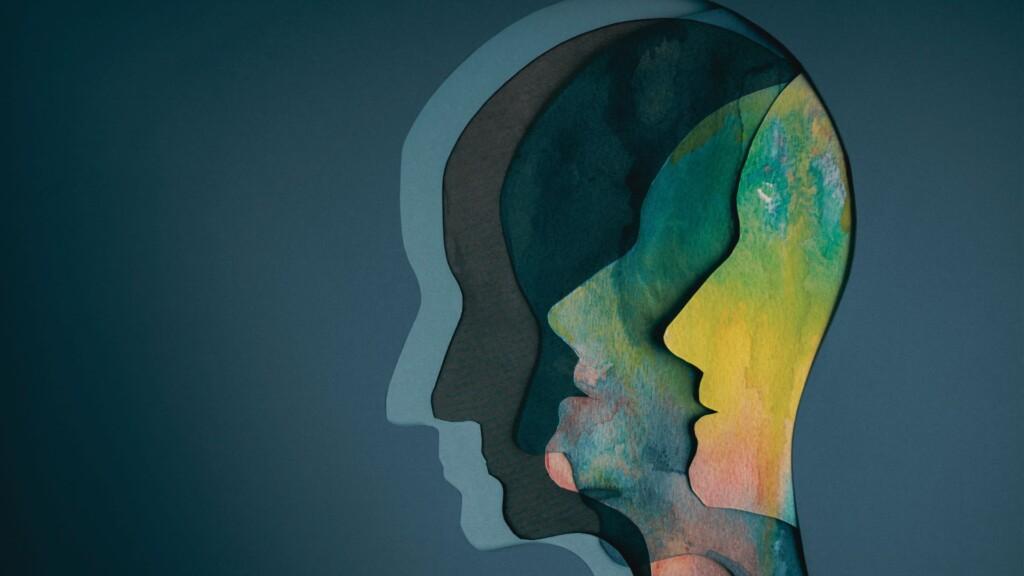
So, as we become aware of our inner experiences, we get better at noticing, welcoming, and managing our emotions, and therefore our reactions and behavior.
But we won’t not be able to dictate or restrain our actual underlying emotions as they arise.
4. The negation of our emotions – the deliberate intention to shift from one emotion to another – intensifies that emotion. are experiencing. And we don’t have the ability to just will our emotions away.
our suppressed, unprocessed and unexpressed emotions show up in much unhealthier ways, or get so intense that they overwhelm us.
While I was growing up, I had no idea that I was suppressing and harboring my anger. My suppressed anger resurfaced as passive aggression, challenging some of my most meaningful relationships. You can read more about my experience with anger in this post called Why is Emotional Self-awareness so difficult?
Avoidance and suppression of our emotions will also lead to our inability to cope with them. If we don’t engage with our unpleasant emotions as they arise, we experience them only when they have grown really intense.
This might be the reason you might not realize you are mad at your partner until you start screaming at him/her for not washing the dishes, or picking up a grocery item. The anger exhibited during these moments is rarely the result of that specific circumstance.
It has built up over time, growing more intense, because it was left unacknowledged, unprocessed, and unexpressed.
And in these cases, our emotions are running the whole show, regardless of the consequences. We become highly overwhelmed and reactive, and no longer in control of our behavior and actions. And this can have significant consequences for us, especially during conflict and high stakes situations.
Below, I’ve included a video that captures the thoughts of Alan Watts, on emotions. Watts was an English philosopher, author, speaker and one of the first people to interpret Eastern wisdom for a Western Audience.
He has a knack for simplifying the complex. If you want to listen to more of his work, check out the Alan Watts playlist on the Savvy Discoveries page.
How to Cultivate Emotional Self-awareness
Emotional self-awareness is a practice which requires intentionality and continuous attention. And in order for it to be sustainable, we need to fully integrate it into our daily lives.
Although we all experience multiple emotions every day, most of us are not conscious of what we are feeling.
Our emotions present themselves in a variety of ways: through body sensations, words, thoughts, or even visually through images.
And our awareness of them starts with one simple question that most of us rarely ask ourselves: What am I really feeling?
Below are some steps that can help you become aware of what you are really feeling:
- Get and Stay Curious: Exploring your inner world from a place of curiosity and without judgement enhances your chances of getting in touch with what is actually going on at the deepest levels. Key to this step is sincere self-inquiry without judgement and assumptions.
- Make Time for Self Check-ins: Check in with yourself a few times day to ask: What am I feeling? Ensure that you have the space and time to be present as you wait for the answer/s to appear.
The answer can arise in a variety of ways: It can come through the body in the form of a subtle pressure or energy, an urge, or a sudden tightness or looseness. Or it can show up in the form of a word: angry, sad, scared, nervous, or excited.
At times, you might not get an answer. You can ask again and give it a bit more time and space. The intention for this step isn’t to land on a clear answer (although that would be nice) but to continue the inquiry. - Acknowledge what arises: Regardless of what arises, acknowledge the emotion. In the absence of an answer, you can acknowledge that none came up. This is completely normal, and can happen, at times, to all of us. Not being able to come up with an answer might make you feel confused, frustrated, or even angry.
In this case, do your best to acknowledge and stay present with those feelings, too. The intention is to inquire and stay curious without attachments to an answer. - Stay present and identify words that align with your feelings: Try to find words or language that best expresses the arising emotions. At times, you might find multiple layers of emotions.
Stay patient. This process can be challenging, especially if you are new to it.
As soon as you identify the surface layer emotion, the path tends to clear a little bit. And you can go deeper to uncover the emotions beneath the surface.
Unexpected and unpleasant emotions can surface. This is the most challenging part. How can you navigate them?
What works best for me is to remind myself of the foundational truths about emotions (the ones I shared earlier in this piece).
Here’s an example, relating to the story I shared about experiencing anxiety while driving.
As I start to feel emotions arise in me, I take a pause, just a few minutes to connect to what might be happening inside of me. And my internal dialogue goes something like this:
Oh, I feeling a lot of anxiety. And fear. That’s not what I thought I would find. Ok, I wonder what they’re doing here.
Then I wait for answers. And wait. And sometimes, wait some more.
Often, long and winding answers surface.
Anxiety is here because I’m scared of uncertainty. And scared of not finding the right next job. And scared of the financial consequences. That’s the reason fear is here too.
How will I pay my bills? Will I have to tap into my savings?
This feels like a big mess. It is scary. That’s why I’m feeling anxious and scared.
And to make things worse, I don’t actually want another job. But if I don’t get one soon, when will money start to roll in? And what will I tell friends and family when they ask what I’ve been up to the last few weeks?
Also, what if I go on a date? When someone asks me about what I do, am I just supposed to say I have no idea what I’m going to do next? I’ll look like a loser.
At this point, I can feel a few different emotions, but I continue to explore. In case I can access anything else.
After a few minutes, I realize there’s shame and guilt underneath the fear and anxiety. I’ve been able to access the various emotions, even if they felt entangled.
I continue to explore, in case I can feel into yet another layer.
I feel relief. What is that about?
I wait again. Give it a few more minutes. And the truth starts to surface.
By allowing myself time and space to dig deeper and feel the emotions that were arising, I was able to acknowledge, and embrace my anxiety, fear, shame and guilt.
And as I started to work through parts of these unpleasant emotions, they lost a bit of their charge, granting me access to my deepest truth: My intuition. The inner knowing that has been guiding me all along, toward a new and wildly different direction.
And that’s the reason relief showed up.
That’s how this process works for me. Once I can engage with what is arising inside of me, I can (most of the time) find my way back to my intuition.
This process helps me ground, center, and to find the kind of peace that feels real.
The ability to become aware and engage with your true emotions is a matter of practice. It’s a skill set we can all develop. It just takes work. And at times, it can feel like really hard work.
But the rewards are sooo worth it.
Emotional self-awareness will connect you to your deepest truth. It will also help you understand yourself, and your patterns. So you can become more intentional and less impulsive.
It will enhance the quality of your most valuable life resources: your relationships.
And by connecting you to your authentic self, it will guide you toward uncovering and living your true purpose.
It’s a game changer.

